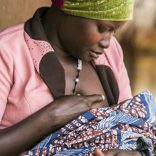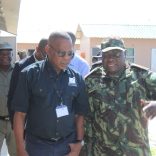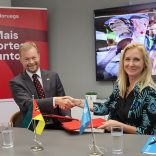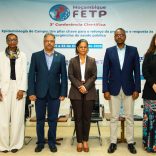Mozambique: Misinformation deters breastfeeding in Nampula province - health authorities
Graça Machel recalls the “collective work” of Mozambique’s literacy campaigns

Screen grab: Universidade Pedagógica de Maputo - UPM
Former Minister of Education of Mozambique Graça Machel recalled yesterday that after independence (1975) only 7.7% of the population, including Portuguese residents, knew how to read and write, characterising the foundations of the education system as a “collective work”.
“This country had around nine million inhabitants, and only 7.7% of the population knew how to read and write. This 7.7% also included Portuguese residents […]. We were literally a country of illiterates,” Graça Machel declared to an open class promoted by the Pedagogical University of Mozambique to celebrate the institution’s 40th anniversary.
According to the former minister – the first to hold the Education portfolio – the few who knew how to read after the proclamation of independence on June 25, 1975 were linked to public administration and education, the group that led the literacy projects that the country needed.
“There was only one primary teacher training school in the country, located in Lourenço Marques [now Maputo],” she added.
Graça Machel recalled that she was appointed to the post of Minister of Education shortly after the proclamation of independence, and that she only knew it when she heard the news on the radio.
“I had no work experience and there I was, sitting as a minister. What did I decide to do? Surround myself with the few people who had much more training and much more experience than I did,” the social activist declared.
The challenge, she said, was clear: to structure a Ministry of Education within a context in which only 7.7% of the population knew how to read and write.
The former wife of the first President of Mozambique, Samora Machel, considered that the foundations of the country’s education system were a “collective work”, the result of the involvement of all Mozambicans.
“The origin of education in this country was not the result of highly experienced and qualified individuals […], it was a collective effort by hundreds of thousands of Mozambicans who organised and structured themselves […]. This is how we made education an instrument for affirming Mozambican identity,” she declared.
The country’s first Minister of Education highlighted the importance of the literacy campaign groups that took over factories and collective farmland in efforts to massify education in the country.
“It was very clear that it was not a small group that would transform education in Mozambique. Everyone was needed,” she stressed.
In a year in which the country marks 50 years since the proclamation of independence, Graça Machel stressed that the notion that Mozambique is indivisible is the main achievement of this half century.
“There have been several attempts to divide us, but we have remained a whole country, from the Rovuma to the Maputo. For me this is the greatest achievement,” she stressed, also citing the gradual emergence of “social awareness” as another positive aspect of this half century.
On June 25, 1975, the first President of Mozambique and historic leader of Frelimo, the ruling party that led the liberation struggle, proclaimed national independence, after a struggle against the Portuguese colonial regime that began on September 25, 1964.












Leave a Reply
Be the First to Comment!
You must be logged in to post a comment.
You must be logged in to post a comment.